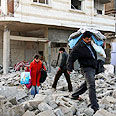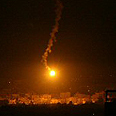

Gazans fleeing homes
Photo: AP

Gaza under fire
Photo: AFP
Israeli pressure on the Gaza Strip is taking its toll on residents, and sources said this, the tenth day of the IDF's Operation Cast Lead, just might be the hardest on Hamas so far.
Palestinians said wide areas of the northern Gaza Strip and Gaza City have suffered bombings from the air, ground and sea.
War in South
Palestinians say father, mother, their five children killed by shell fired from Israeli Navy ship in Gaza's Shati refugee camp. Elderly man, grandson killed in Strip's Zeitoun neighborhood before dawn. Army yet to respond to report
Residents are on high alert and many have fled to the center of Gaza City for fear of being arrested.
Most of the residents who remained in the northern Strip are those who were unable to escape or had nowhere to go. Meanwhile, those in Gaza City await the IDF.
Hatem Masri, who lives in the northern Strip, told Ynet that people leave their houses only when necessary, and that many men have left home for fear of being arrested.
"I left my wife and daughter on Thursday and haven't seen them since then," said Masri, who works as a clerk for the Palestinian Authority. "In many operations the military tends to arrest the men."
Masri added that residents fleeing the northern Strip were crowded up with their relatives in Gaza City. "You can find 30-40 people sitting in one house, and if the building is made up of a number of households, tenants from the upper floors go down and sit on the bottom floor," he said.
According to Masri, people are afraid to walk in the streets. "They have started to adopt rules; don't walk near a mosque because it could be bombed, don't walk near Hamas men's houses, and try to stay out of groups of four or five people."
Despite precautions, Masri said on Sunday he was asked by his two-year-old daughter to buy her markers. "The child asked so many times on the telephone, that I gave in and went out, but I walked and walked the streets and the stores were all closed and I couldn't get her markers," he said sadly.
Masri continued to say that there was not enough flour in the Strip to make bread, and a shortage of gas was also felt and people were using 30-year-old primus stoves.
'No mourners' tent to honor the dead'
Despite the aerial bombings, residents found the daily routine to be boring. "In most hours of the day there is no electricity in my area," Masri said.
"And since there is no electricity, we crowd around an old stereo that works on batteries, and if ther is a shortage of batteries then people follow the news online through their cellular phones that we charge in the middle of the night when the electricity comes back.
"You see four or five people with one cell phone. This is no way to live, it's frightening and boring and very stressful."
Masri said his family buried one of their relatives on Sunday that was killed from IDF fire. "Right after the burial when we arrived at the mourners' tent someone said the army attacked four mourners' tents and then everyone fled and there was no mourners' tent to honor the dead," he said.
"There's nothing to do during the day, just stay close to the cell phone and stereo, listen to the news, and fear that the ground operation will reach our areas too."
Muhammad Madhoun, a resident of Beit Lahiya said he recently opened a computers' business in which he invested a great deal of his money. "In the morning I woke up and the store's neighbors called to let me know that the whole place was destroyed. There are no computers, no equipment, no furniture, it's all ruined," he said.
Despite the pain, Madhoun expressed relief at the fact that so far, he has only suffered property damage. "My brothers' homes were destroyed, but thank God, so far we haven't had any injures, we just sit and pray," he said.















